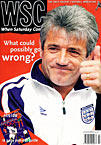 The blame for Wimbledon's relegation has been placed with Egil Olsen, the Norwegian owners and the demise of the 'Crazy Gang', but that story doesn't wash, says Kris Stewart
The blame for Wimbledon's relegation has been placed with Egil Olsen, the Norwegian owners and the demise of the 'Crazy Gang', but that story doesn't wash, says Kris Stewart
Relegation. Even out of context it’s a horrible word. Not a word I’d even thought much about before the past few weeks. A horrible end to a horrible season. Read the press and you would believe the fault for Wimbledon’s relegation lies with Egil Olsen, our Norwegian owners and the demise of the “Crazy Gang”. But there are many Wimbledon fans who do not buy that version of events.
Olsen inherited a team which had won only one of its previous 20 games. Even before Joe Kinnear’s heart attack at Hillsborough in March 1999, subsequently elevated to the status of a symbolic turning point, the team had gone nine games without a win. Morale was low and the club’s image of itself as a self-contained “family” with a no one-likes-us mentality did not bode well for the introduction of an outsider.
Olsen tried to introduce a new style of play, involving a zonal defence and fast counter-attacks. From day one, it seemed clear that some people didn’t want the new manager to succeed. Robbie Earle warned him before the season started not to change things. Joe Kinnear reported that he had told “the lads” that “spaces don’t score goals”. Football writers fell over themselves to present Olsen either as a tactical dinosaur or as an idiot in wellies.
After a win on the first day at Watford, we didn’t manage another in the league until the middle of October, at home to Bradford. Apart from that there was the odd bright spot, the odd glimpse of what Olsen was all about, at Old Trafford and at home to Leeds. But mostly it seemed we were just playing a poor version of the football we’ve always played.
After the final whistle at Southampton I felt sorry for players such as Neal Ardley and Neil Sullivan, Dons fans through and through who have been with the club since the ages of 11 and 14 respectively. But I was angry with the players who had played as if they couldn’t care less and who had taken their disagreements with the manager to the press. I was also angry with the ex-Dons who I had regarded as heroes until their well-publicised attacks on the club. And I was angry with the football writers who, after hating us for 14 years, suddenly decided they loved “the Crazy Gang” and spent the season trashing any attempts to push through changes at the club.
What of this famed “Crazy Gang”? It was a name adopted by a group of players who took us through the league during the Seventies and Eighties, before Fashanu and Wise got there and years before Robbie Earle. As far back as I can remember it’s just been a marketing tool – the name of our junior members section; an embarrassing piece of embroidery on the shirt; an easy tag for the press to hang on to. Talk of the “Crazy Gang” spirit does not tell you much about Wimbledon. Any successful football club needs strong team spirit. Beyond that, what group of overpaid young blokes doesn’t engage in the odd silly prank?
I wasn’t angry with Egil Olsen. Given the right circumstances I am still convinced he would have been an excellent manager for us. But he did not receive unconditional support either from above, thanks to the ambiguous position of former owner Sam Hammam for most of the season, or from below, where too many players were disinclined to play for him.
Nor was I angry with the Norwegian owners. Within a week of Bjorn Gjelsten finally buying Hammam’s shares, we had a £1 million deal to buy the land for a new training ground and a commitment to spending £5 million to build it. The club is once again talking to Merton Council about finding a site for our own stadium.
Gjelsten and the other owner Kjell Inge Rokke also own the Norwegian team Molde. In their first season as owners, Molde were relegated. Since then, Gjelsten and Rokke have taken Molde from the second division to the Champions League, building them a new stadium along the way.
I’ll take that, even if it does mean a season in the Nationwide. And if it also means an end to some of the tired cliches about the club along the way, then so much the better.
From WSC 161 July 2000. What was happening this month
I'd forgotten about the use of 'The Nationwide' as a synonym for 'The Football League'.
Wow. 12 years on and this is like reading one of those embarrassing soliquies to new, inspiring political leaders who turn out to be bloodthirsty despots after a couple of years in power.